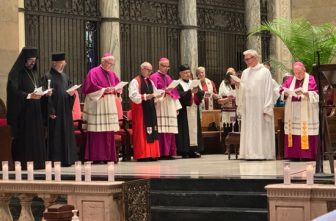
Psychologist Richard Johnson, 73, literally wrote the book on retirement for Catholics in 1999, when Liguori Press published “Creating a Successful Retirement.” In the years since, he’s published two other books that connect psychology and faith to life after work. He is the founder and president of the Johnson Institute in St. Louis, which helps people, especially older adults, deepen their communion with God. He continues to write and speak about retirement and other aspects of aging, which he calls “the master teacher.” “The more thoughtfully an individual sees retirement as a classroom of continuing learning, grasps the spiritual undercurrent of meaning of retirement and embraces the opportunity of life enhancement inherent in retirement, the more she (or) he can appreciate the intrinsic value of the retirement years as pearls of wisdom from God,” he told The Catholic Spirit. Johnson lives in St. Louis with his wife of 52 years, Sandra. They have three children and six grandchildren. He answered questions for The Catholic Spirit via email. His work can be found at senioradultministry.com and spiritualstrengths.org.
Q) When people think about “planning for retirement,” usually it means meeting with their financial advisor and making decisions about money and investments. You see a bigger picture. What is that, and why is it important?
A) Financial planning, while vitally important for our sustenance and survival in our retirement, is only the means to the real purpose of retirement: to find the deep peace of mind and heart of knowing (not simply believing) that we are children of God, motivated by love, and called to offer the gifts and talents given to us by God to others.
Q) What questions should Catholics be asking themselves as they approach retirement?
A) What are the gifts and strengths God has invested in me? What is my purpose now? How can I help bring about the “reign of God” on this earthly plane?
Q) What pitfalls do you see Catholics making as they prepare for — or enter into — retirement?
A) Seeing retirement as “rest and play.” Rest is wonderful; play is refreshing, but rest and play are given to us as means of respite from our primary calling of pursuing awe, wonder and delight — all consequences of luxuriating in faith, hope and charity. Retirement is yet another life stage when we can more confidently pursue awe, wonder and delight. If we are not, then something needs changing.
Q) Retirement is often pictured as a time where people reap the rewards of years working, and can focus on the things they want to. How might a Catholic consider spending this new time that is reflective of his or her faith and values?
A) Regular involvement in sacraments, prayer, spiritual reading, Bible study, retreats, spiritual growth groups, classes, online spiritual formation, Catholic radio, etc.
Q) People often talk about looking forward to retirement, but it also can come with certain losses: fulfilling work, a regular routine, relationships with coworkers, the stability of a paycheck, a work identity. You’ve noted that loneliness is a problem you’ve observed in your work. How can retirees form new friendships and deepen existing ones?
A) The answer to this is easy. However, bringing this to life is tremendously difficult. Practice virtue. Virtue is God’s spiritual energy. Virtue powers the six functions of our personality: believing, perceiving, thinking, feeling, deciding and acting (behavior). Virtue gives us purpose, life, spiritual vigor, psychological refreshment. (If you would like to know your six signature virtues, take the Spiritual Strengths Profile online on spiritualstrengths.org.)
Q) What role does one’s relationship with God play as retirees form their post-work lives?
A) To paraphrase a well-known quote by the late football coach Vince Lombardi: “Relationship with God is not the biggest thing. It’s the only thing!” Retirement is God’s gift to people of faith to follow their God-calling, their ministry, their new-life purpose and find peace.
Q) What is important for the children and friends of a recent retiree to understand about this life transition?
A) The retiree is going through what we call in psychology a “crisis of attrition.” Retirees are experiencing loss (even if they don’t seem so). They are to some degree mourning this loss. The loss is internal: loss of status, loss of the meaning of “earning a living,” loss of connection, meaning, relationships, purpose, productivity, etc. The mourning process can last months or, if unsuccessful, can last years, perhaps even a lifetime.
Q) Your work emphasizes the importance of adult faith formation and parishes engaging older adults. How can people use their retirement years as a time to more purposely grow in faith?
A) The only course is to follow the lead of Christ. Christ is our model for successful living. So, what did Christ do? Christ was known as the teacher and the healer. We are called to do the same, always guided by the gifts, talents, strengths and interests we have been given. How does one achieve all this? Investigate your deeper spiritual self and, of course, pray. I recommend parish ministries specifically targeted to help accomplish these vitally important goals.
Q) Have you seen the uncertainties around COVID-19 affecting people’s decisions around retirement? If so, how?
A) COVID-19 brings uncertainty, vulnerability, insecurity. I have no data to back this up, but “my gut” tells me that when we are apprehensive, we generally try to “stay the course.” Psychology tells us that when we are frightened, we either “fight, flee or freeze.” Yet, when we are “with” God, we are at peace in mind and heart. Our faith gives us the strength, fortitude, commitment, purpose, hope, empathy, transcendence and inspiration (to name but a few). All these provide us with what we need to overcome fear, and not fight, flee.
Q) What advice do you have for someone who is preparing for retirement, or has recently entered into it?
A) Read my book “Creating a Successful Retirement: Finding Peace and Purpose,” and take the Christian Retirement Challenges Profile. The CRCP is a 120-item questionnaire that generates a 20-page comprehensive picture of how well you are addressing the 15 factors of retirement success (see related sidebar), whether you are preparing for retirement or already retired. The CRCP results provide you with your individualized report: an accurate picture of the retirement success factors where you are doing well, and those that need more focus. Both the book and the CRCP can be found at senioradultministry.com.
Q) What else would you like to add?
A) Pray to the Blessed Mother!
15 ways to make retirement your true-life adventure
What are the core psycho-spiritual ingredients that spell the difference between retirement years of fragmentation and lifelessness, and years of advancing personal meaning and fullness of life? These 15 questions provide you with a new perspective about retirement growth: a perspective that enables new thinking, feelings, choices and actions that can transform your retirement into a bountiful stage bringing you deeper joy, clarified life meaning and vitalizing purpose.
- How do I disengage from my work/career and maintain my unique sense of self? The degree to which you have been able to psychologically move away from your full-time job as your major source for self-identity, and can emotionally take on other activities (recreational, social, spiritual) together with a deepened mental framework as a child of God, which supports a self-esteem of new definition.
- How do I find genuine value in my retirement years without my work/career? The degree to which you give worth and significance to retirement as a personally meaningful and spiritually uplifting time in life.
- How will I order the structure of my retirement life without work? The degree to which you rely more on God rather than primarily on your own internal sense of self-direction for making plans and decisions for your retirement life, rather than relying on others giving you direction from outside yourself.
- How can I thrive, and not merely survive in retirement? Inspiration and joy. The degree to which you perceive that you are experiencing wellness, on physical and emotional levels, and wholeness on the spiritual level of your personality.
- How will I be able to support my lifestyle in retirement? Courage and self-discipline. The degree of confidence you possess that you have planned sufficiently well for your retirement finances so you can maintain an adequate standard of living.
- How can I find genuine happiness in retirement? Wholeness and patience. The level of life-satisfaction (psychology’s code word for happiness) you currently experience, which includes personal contentment, physical health, home life harmony, self-esteem and spiritual integration.
- How can I develop and maintain hope in the future? Hope and perseverance. The total level of life-satisfaction you foresee for yourself in the next stage of life.
- What level of personal meaning and purpose will I find in my retirement years? Trust and Inspiration. The degree to which you have found, and can actually implement a sense of personal purpose and meaning.
- How can I find supportive, genuine leisure in retirement? Joy and love-finding. The degree to which you can discover personally satisfying endeavors which rejuvenate your body, and/or stimulate your mind, and/or enrich your soul.
- How can I remain fully open to new growth and development on all levels in my retirement years? Adaptability and humor. The degree to which you can consciously adapt to changes outside yourself by making modifications within yourself.
- How can I remain as fully alive in retirement as I did in previous stages? Wisdom and empathy. The degree to which you experience the glow of the light of love, understand your inner beauty and recognize your spiritual distinctiveness.
- How can I live in happiness by serving others without losing myself along the way? The degree to which you are free from a sense of burden or strain from caregiving responsibilities either for aging parents or relatives, and/or adult children, by inviting spiritual principles into the endeavor
- How can I find sustaining sense of connectedness in my retirement years with those closest to me? Love and faith. The degree to which you derive a love-centered sense of togetherness, respect, communication, deep sharing, trust and commitment from your primary (marital) relationship and/or family life.
- How do I grow in youthfulness as I advance in maturity? Gratitude and honesty. The degree to which you see your maturation process (aging) as a time of emotional and spiritual vitality and vibrancy full of potential for dynamic and ongoing personal growth.
- How can I find authentic and credible replacements for the benefits I formerly received from my work? Transcendence and charity. The degree to which you offer your personal resources — your time, your talents and your wealth — in God’s service.
— Richard Johnson



